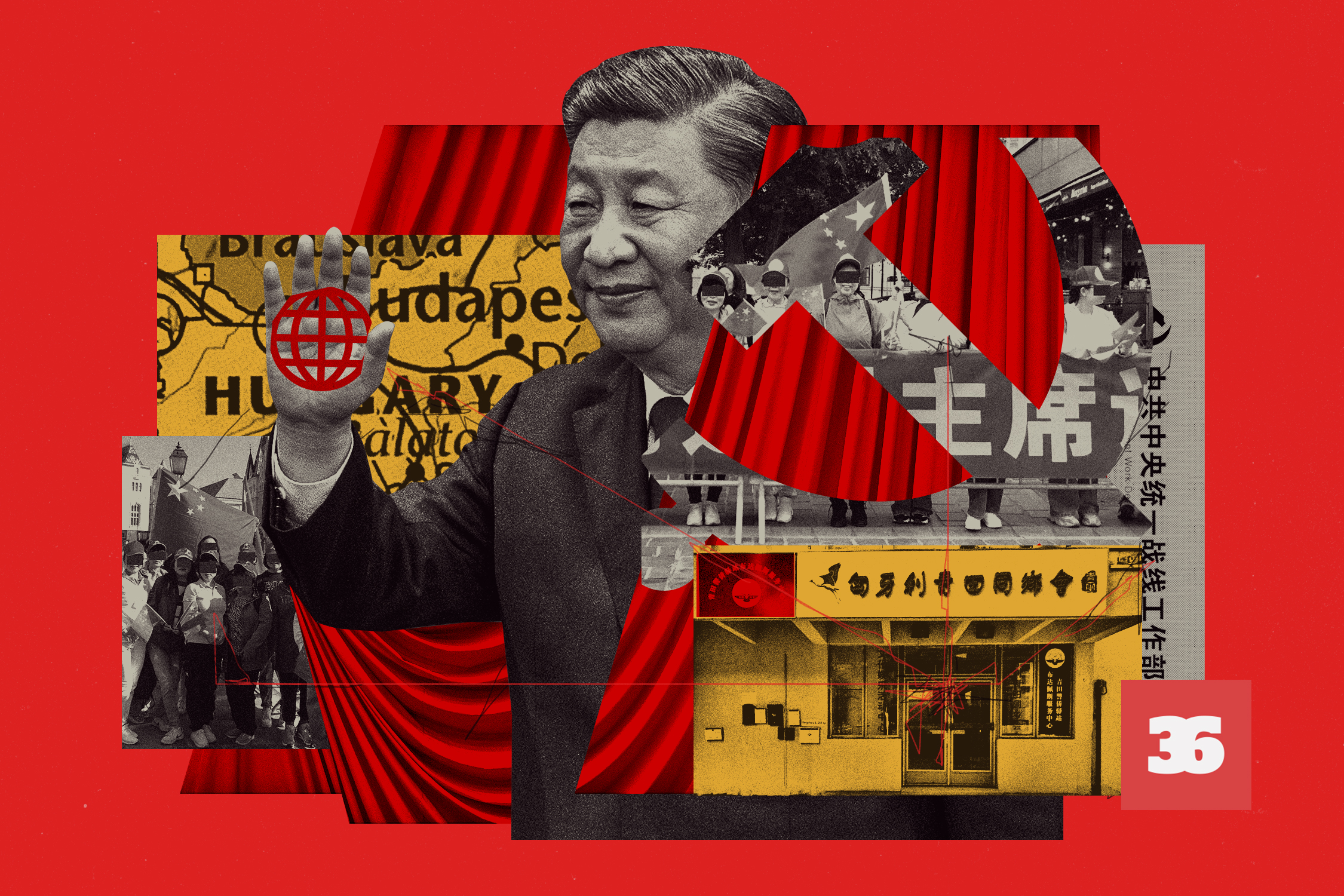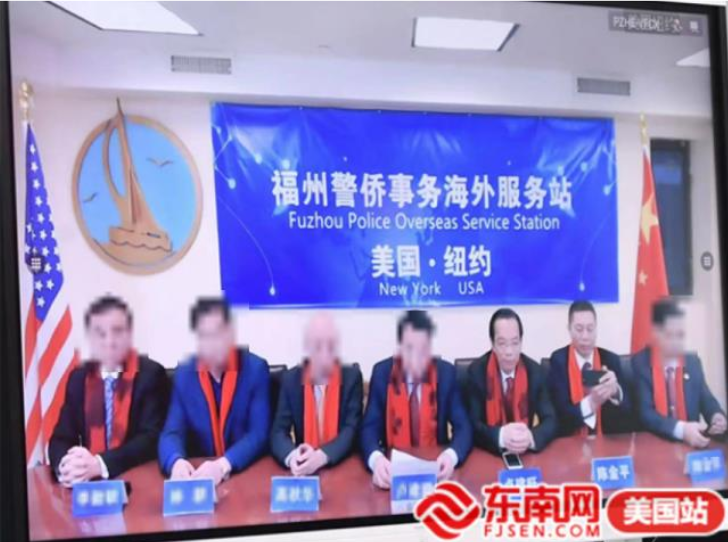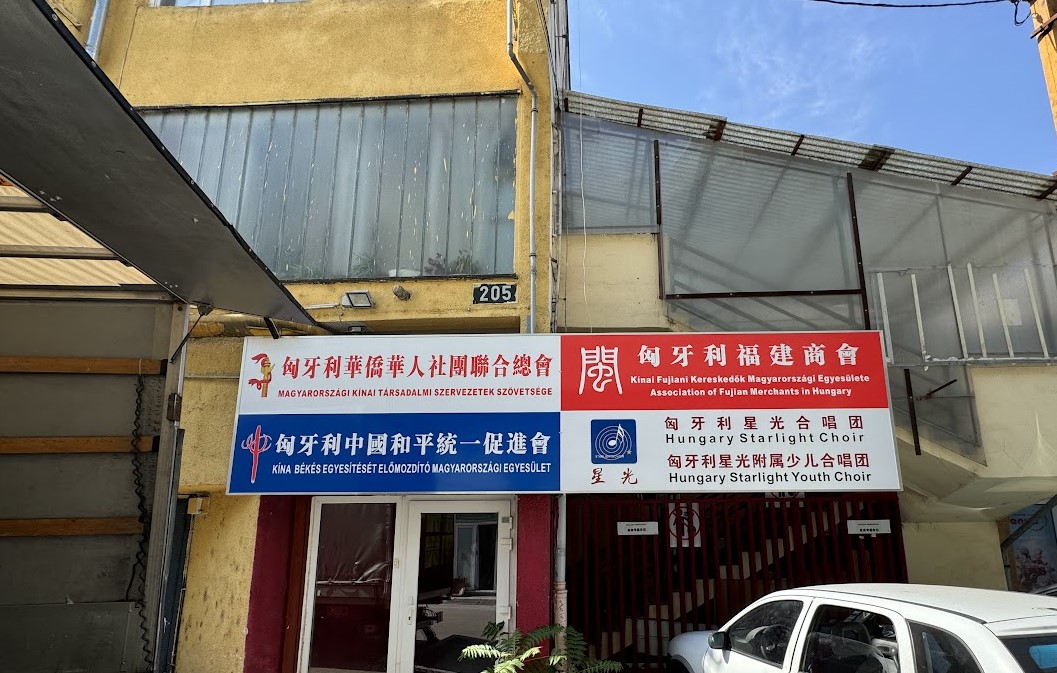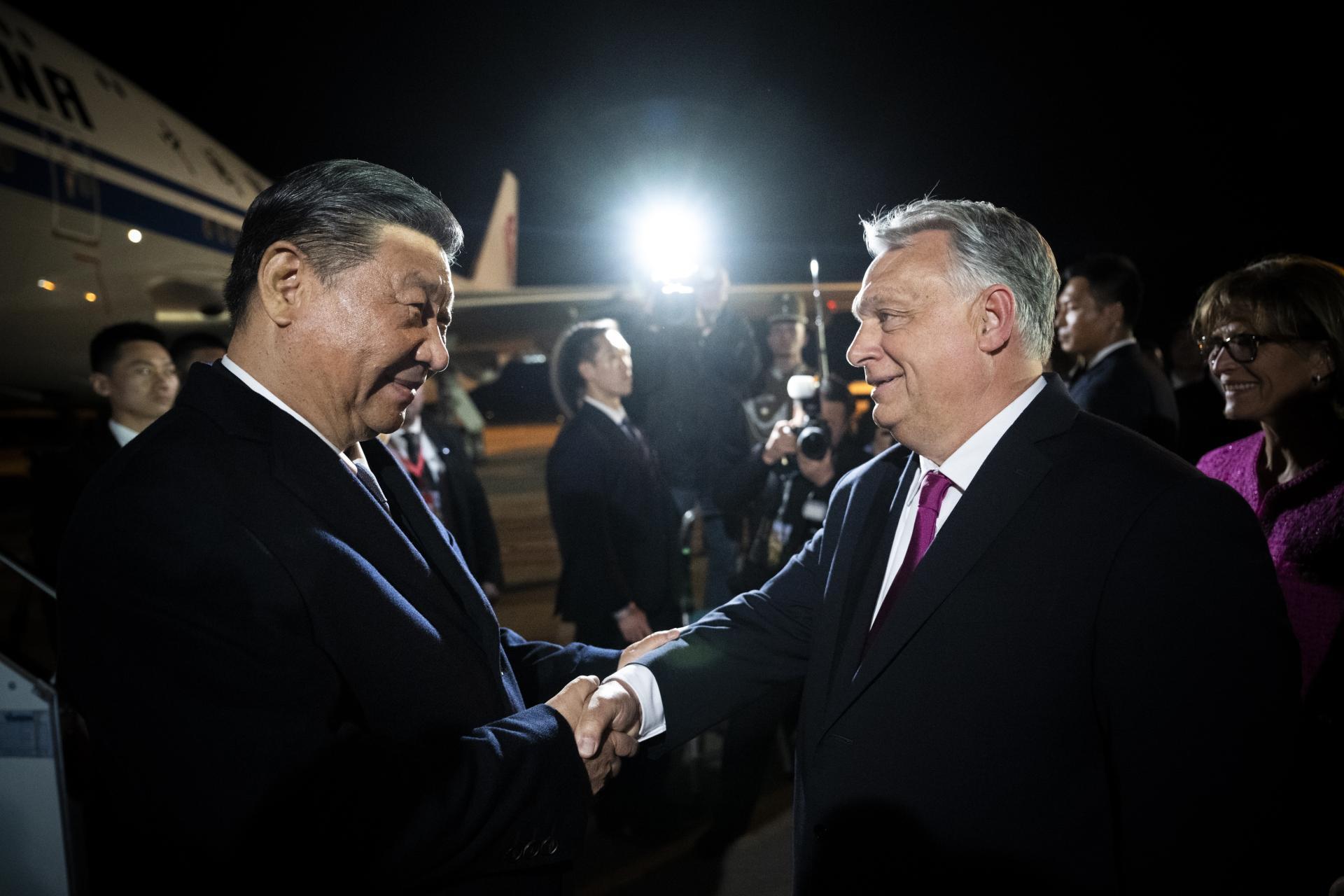How the Chinese Communist Party’s United Front extends its influence in Hungary

Last November, a high-ranking Chinese delegation arrived at a seemingly insignificant department store on Kőbányai Road in Budapest. The store sells Chinese goods and is owned by the family of the president of the Hungarian Chinese Women’s Association.
She was there to meet the delegation, elegantly dressed alongside other members of the women’s association. They provided entertainment, with a cultural program in which they sang the patriotic Chinese song “My Motherland and I” in snow-white dresses. They later danced on stage in traditional costumes.
But the delegation was not there to shop or watch a cultural show. The delegation, which later met with China’s ambassador to Hungary, came from a unit of the Chinese Communist Party, which plays a key role in increasing the global influence of the Asian superpower. This organization is called the United Front, one of whose main tasks is to control key members of the overseas Chinese diaspora and help suppress voices critical of China.
In recent years, the authorities of several Western countries have uncovered covert operations conducted by the United Front in which individuals and organizations linked to them have sought to illegally obtain information or influence local political processes. The US Attorney’s Office recently charged a former New York State official with acting on behalf of China with the help of people linked to the United Front, in exchange for money and various valuable gifts. A recent annual report by the Czech counter-intelligence service also specifically names the United Front as having carried out covert operations in the Czech Republic in support of Chinese intelligence operations.
Hungary, a country with increasingly close relations with China, is not known to have ever taken action against the United Front. However, Direkt36, as part of an international investigative journalism project, has revealed that this unit of the Chinese Communist Party is also carrying out extensive work in Hungary. For example, during the political controversy surrounding the Fudan University’s campus in Budapest, Chinese organizations linked to the United Front in Hungary tried to persuade the mayor of the capital’s ninth district to act in China’s interests. There are also indications that the United Front played a role in organizing activities around the visit of Chinese President Xi Jinping in May.
The international project that led to these findings was led by the investigative crew of Swedish TV4 and cooperated with Safeguard Defenders, an NGO specializing in human rights abuse in Asia, as well as several other European newsrooms. As part of the investigation, we examined a document leaked to an online hacker forum that contained the names of more than two thousand individuals who run Chinese associations abroad and who allegedly had links to the United Front.
Join the Direkt36 supporters’ group and get insight into investigative journalism! Details →
For a significant number of the names on the list, journalists and researchers were able to confirm from public sources that individuals and organizations related to the countries they have investigated are indeed linked to this unit of the Chinese Communist Party. In Hungary, 56 such individuals and 26 associations were identified, including organizations officially engaging in business, political and cultural activities. Among those identified were, for example, a businessman who owns several Skála department stores, other entrepreneurs and journalists and staff of Chinese-language newspapers operating in Hungary.
Official government authorities, the Chinese Embassy in Budapest and the associations contacted did not respond to Direkt36’s request for comment.
The magic weapon
The United Front has a long history. It was already active in the first half of the 20th century when the Communist Party led by Mao Zedong fought for control of China. Mao even described the United Front as a „magic weapon”, whose main purpose at that time was to fight individuals and organizations considered as internal enemies.
The organization fell into obscurity for decades but has been reborn under the current president, Xi Jinping. In 2013, the United Front even published a book titled „Xi Zhongxun on the United Front”, which contained 109 speeches, articles and other writings by the current president’s father.
Xi Jinping has made significant improvements to the United Front. According to research by an Australian university, the Chinese president has added 40,000 cadres to the organization, merged several offices under its authority and given the Communist Party a more direct influence in its day-to-day operations. „The group, which had an estimated budget of $2.6 billion as recently as 2019, serves as the party’s intelligence agency”, the New York Times recently wrote about the organization.
Aditionally, under Xi, the United Front has begun conducting activities outside of China. It has been previously active in monitoring Chinese communities abroad, mobilizing them in service of the party’s goals, as well as controlling foreign Chinese-language media.
According to a US State Department report from last year, the United Front systematically cooperates with Chinese intelligence services to achieve its goals.
China’s Ministry of State Security and the United Front have cooperated at various levels to suppress or threaten Beijing’s critics abroad, said the report.
It cited as an example of such cooperation the regular meetings and cooperation between officials from the two organizations during the 2019-20 pro-democracy protests in Hong Kong.
There is growing evidence that the United Front is active in other Western countries.
A few years ago, the Spanish-based NGO Safeguard Defenders, which focuses on human rights abuses in Asia, revealed that China with the help of the United Front operates at least 102 so-called administrative centers worldwide.
However, according to Safeguard Defenders, these centers are essentially operating as illegal police stations, bypassing local authorities and violating the sovereignty of the country concerned. According to their research, these centers have also been secretly used to monitor Chinese residents and use a variety of methods to force them to return to China. The report describes examples from Serbia, France and Spain of Chinese residents being persuaded to return home by staff at these local centers.
According to a US official document published last year, such illegal police stations have also operated in the United States. Based on an FBI agent’s testimony, Lu Jianwang was tasked by a United Front officer to set up the facility during a visit to China.
The official reason for the request was to help their compatriots stranded abroad during the pandemic to return home. But Lu and his Chinese-affiliated associations were given quite different tasks as well. Chinese officials have repeatedly instructed them to locate certain Chinese people living in the United States. One such person was reported to have committed fraud in China and then fled the country illegally. “Please see if there is any way to deport [name] back to China, thanks,” Lu was instructed. According to the document, this eventually led to regular harassment and threats against the person they located and his family.
According to the FBI agent’s statement, the New York-based center was called the Fuzhou Overseas Police Station, and none of the people who worked there reported to officials that they were working on behalf of the Chinese government in the United States.

“Fuzhou Police Overseas Service Station, New York, USA.” The FPSSOC Principals in the picture include, among
others, the defendants LU JIANWANG and CHEN JINPING, located in the third-from-right
and second-from-right positions.
China denies that it operates police stations abroad. They claim that the facilities are administrative centers staffed by volunteers to help Chinese living abroad with matters such as renewing driving licenses and other identity documents. However, even if they only act in the capacity that the Chinese government claims, they would still be violating international law.The Vienna Convention on Consular Relations, which has been globally adopted, (including by China), clearly states that only those who have been appointed and approved by both countries can carry out consular tasks. It is therefore illegal for these offices to operate without the consent of the host country.
Businessmen and journalists in the United Front network
Two years ago, Safeguard Defenders identified two sites in Hungary that they believe were operating as illegal police stations. They were allegedly on Golgota Road and Cserkesz Street in Budapest.
After the publication of the report, Márton Tompos, MP (and current president) of Momentum Mozgalom visited these stations, and even found the official blue sign of the Qingtian police on the Golgota Road building, alongside the writing of Hungarian Qingtian Association. At the time, the Hungarian Ministry of Interior denied the existence of Chinese police stations in Hungary. After Tompos’s visit, the sign of the Qingtian police was quickly removed from the building.
In the summer of 2024, Direkt36 journalists also visited these facilities. When we arrived at the alleged police station on Golgota Road, we saw a building equipped with cameras but still looking abandoned. The Józsefváros Market is located behind the building, so we took a look at what was visible from the side of the market. There were no signs for Chinese police, but above the entrance to the building on the market side, there were large signs with the names of three Chinese associations.

Signs of the Association of Chinese Social Organizations in Hungary, the Association of Fujian Merchants in Hungary and the Hungarian Association for the Promotion of Peaceful Reunification of China on the building of the alleged Golgota Road police station. Source: Direkt36
These associations are all linked to the United Front.
One of them is the Hungarian Association for the Promotion of Peaceful Reunification of China, which provides a forum for those who oppose any “China-dividing activities” such as Taiwan’s independence. Among their principles is that their members must abide not only by the laws of the host country but also by the constitution and regulations of the People’s Republic of China.
In 2022, the president of the association attended a conference of a United Front sub-organization, which adopted a declaration rejecting Taiwan’s independence.
The signing associations claim that the US and Taiwanese “separatists” aim to control China through Taiwan.
“In this regard, our Hungarian Chinese community has issued a statement supporting the Chinese government’s solemn position,” the association’s president said under a huge red banner.
The conference was also attended by the leaders of 18 other Chinese organizations in Hungary.
According to the court’s website, the Hungarian Association for the Promotion of Peaceful Reunification of China is registered at Ernő Street in the ninth district of Budapest, but Direkt36 found only a sign for a Hungarian-Chinese travel agency that appeared to be closed at this address. The representative of the association was contacted by e-mail, but did not respond to Direkt36’s questions.
Join the Direkt36 supporters’ group and get insight into investigative journalism! Details →
Direkt36 has identified nearly thirty Chinese organizations operating in Hungary whose leaders have links to the United Front. These leaders, for example, receive delegations from United Front sub-units, are invited to state ceremonies in China and may also be present at political conferences attended by members of the United Front and China’s highest-ranking politicians. One such event was last year’s 10th conference specifically hosted for Chinese associations abroad, which welcomed several Hungarian organizations and was attended by Chinese President Xi Jinping.
Such conferences also lead to business agreements. For example, in 2019, Cao He Ping, an influential businessman living in Hungary who owns several Skála department stores, signed an international trade cooperation agreement on traditional Chinese medicine in Beijing at a conference. Cao also has more direct links with the United Front. A report on a Chinese government website mentions Cao as a board member of a United Front sub-organization. The association, which is involved in international exchange programs, aims to strengthen the national identity of Chinese youth living abroad and increase their loyalty to the motherland.
Direkt36 has already reported that Cao is also the president of a Chinese-Hungarian association, whose events are regularly attended by Péter Szijjártó, Minister of Foreign Affairs and Trade, and in which Lajos Oláh, MP of the Demokratikus Koalíció also holds a leading position. The Great Wall Hungarian-Chinese Friendship Association has initiated an award for people who have done a lot for Sino-Hungarian relations. Former Socialist Prime Minister Péter Medgyessy, among others, has received such an award.
Cao He Ping did not respond to Direkt36’s request for comment. However, a colleague of his told Direkt36 that the businessman is in China to attend the celebrations for the 75th anniversary of the founding of the People’s Republic of China.
There are some Chinese in Hungary with links to the United Front who work in the media.
Members of the Chinese-language press working abroad are not only correspondents but also guests at events organized by the agencies under the United Front. One such event was a media forum in China, which was organized to communicate the Chinese Communist Party’s instructions to editors of Chinese press abroad. At the event, media staff were encouraged to publish articles favorable to China and a declaration to this effect was signed with the participants. Eight editors and newspaper directors from Hungary attended the event, many of them members of local Chinese associations.
Among them was Teng Wei Jie, founder and editor-in-chief of the Chinese-language newspaper New Herald, registered in Jegenye Street, Budapest. Teng founded the New Herald in 2000 with his wife, whose name also appeared on the list of people allegedly linked to the United Front leaked to the online hacker forum. The paper mainly covers Chinese and Hungarian economic, cultural and political news, but their social media pages also featured several pieces of Hungarian government propaganda ahead of the elections in June.
For example, a day before the election, they posted a video made by Fidesz which they translated to Chinese, in which Viktor Orbán, prime minister of Hungary talks about how the election must be won or the country will drift into war.
According to experts, the Chinese Communist Party has already been actively involved in the creation of several Chinese associations operating in Hungary.
According to Pál Nyíri, a professor at Corvinus University in Budapest, these associations were originally set up by Chinese businessmen who settled abroad but wanted to do business with the Chinese government and party organizations. Those who joined the associations hoped to gain some sort of advantage, for example in the procurement of goods, by greeting Chinese party and state delegations. According to Nyíri they also saw social advancement in having their picture taken with such important people.
A similar view is shared by sociologist Fanni Beck, whose research includes Chinese families who have moved to Hungary with a residency permit. However, Beck says it is a relatively new development that during Xi’s presidency the United Front has begun to use existing foreign diaspora organizations for its own purposes.
Complying with two countries’ principles
With the Orbán government’s increasingly close ties to China, the Chinese Communist Party has less need for these organizations to gain political influence in Hungary than in Western countries more critical of China. Even so, local organizations with links to the United Front are trying to shape Hungarian public opinion on China-related issues.
This happened, for example, in the political debate over Fudan University.
Back in 2021, Direkt36 revealed that the Hungarian government had secretly agreed with China to build the Budapest campus of Shanghai’s Fudan University in the capital’s 9th district with a HUF 500 billion Chinese loan. In protest against the plan, the mayor of the district, Krisztina Baranyi named the public spaces surrounding the planned site after communities and leaders oppressed by China. These included the Uyghur Martyrs’ Road and Dalai Lama Road.
Several Chinese associations in Hungary protested against this. Baranyi has received a letter signed by the leaders of 16 Chinese associations in Hungary, who claim to be “representatives of the 40,000-strong Chinese community”. They have asked the mayor to reconsider the renaming of the streets surrounding the planned Fudan University campus, which they say offends China’s political views.
“We have to meet the political thinking of the host country, but also the expectations of the mother country, China. Therefore, we felt bad when the names of the streets surrounding the Fudan University area were changed in a way that was incompatible with the political thinking of the motherland,” they wrote in the letter, which included 10 signatories from organizations that Direkt36 researched as being linked to the United Front.
The United Front’s activities in Hungary were also visible during the Chinese president’s visit to Hungary in May 2024.
Xi Jinping was greeted by hundreds of flag-waving Chinese people in red caps in Budapest. The Chinese, who were coordinating the crowd and also wore caps, told HVG’s correspondent that the embassy had organized the waving action. However, several of the crowd named the United Front as the organizer when the journalist asked them where they got the red caps and flags from.

Orban and Xi in May this year – Source: Prime Minister’s Press Office/Benko Vivien Cher
Several Chinese associations in Hungary were also involved in organizing the visit in May. Márton Tompos, a member of Hungarian parliament, spotted from reports on the internet that the Hungarian Qingtian Association was responsible for coordinating the “security and welcome team” during Xi’s visit. The articles specifically mention the association’s secretary-general Fan Qiaoxiong, who was quoted in one of the largest Chinese portals as the contact officer of the alleged Golgota Road police station.
During the visit, the Hungarian authorities and the Chinese organizers did not leave any room for any dissenting opinions. During Xi’s visit, the Tibetet Segítő Társaság (Tibet Supporter Society) planned several days of demonstrations, but the police refused their request to display Tibetan flags along the convoy’s route.
Members of the Society nevertheless tried to demonstrate at several locations but were met with Chinese resistance. “Wherever we appeared with Tibetan flags, 10 to 15 Chinese appeared within a few minutes, and sometimes they even attacked us,” Tibor Hendrey, the organization’s leader told Direkt36. According to Hendrey, on 10 May on Attila Street in the 1st district of Budapest, red-hatted Xi Jinping supporters snatched the Tibetan flag from his hand and hit him several times with sticks. The society has been involved in several demonstrations in the past when high-ranking Chinese politicians came to Hungary, but Hendrey said they had “never been confronted so aggressively” by those who did not sympathize with their views.
The Chinese Embassy in Budapest also helped to draw crowds to the streets to welcome the President. According to a Chinese report, members of the Hungarian-Chinese Women’s Association – who we described at the beginning of this article as welcoming a delegation from the United Front sub-unit – carried out the “orders of the embassy leaders to do the work of the welcoming team” at Buda Castle.
A Chinese man, who asked to remain anonymous and has lived in Hungary for nearly ten years, told Direkt36 that on 16 April he received a phone call from a friend who “does not work for the embassy but has close ties to them” asking him to join the welcoming of Xi Jinping in Budapest. The call came a week before Gergely Gulyás Minister of the Prime Minister’s Office officially announced the Chinese president’s visit. The man asked if he could get more information about the visit first, to which his acquaintance replied that “he couldn’t send anything in writing because that would be evidence”.
Sociologist Fanni Beck, who is in contact with several Chinese living in Budapest, told Direkt36 that one of her acquaintances was called by someone who introduced themselves as a person working for the embassy. The person also offered money to Beck’s acquaintance to attend the event, but they refused the offer.
According to Beck, it is important to point out that it is not at all common for Chinese living in Hungary to participate in the activities of the United Front. “The people I meet come here because they don’t like the Chinese system. They avoid these associations as far as possible,” the sociologist said.
Szabolcs Panyi contributed to this article.
Illustratuion by Péter Somogyi (szarvas)


